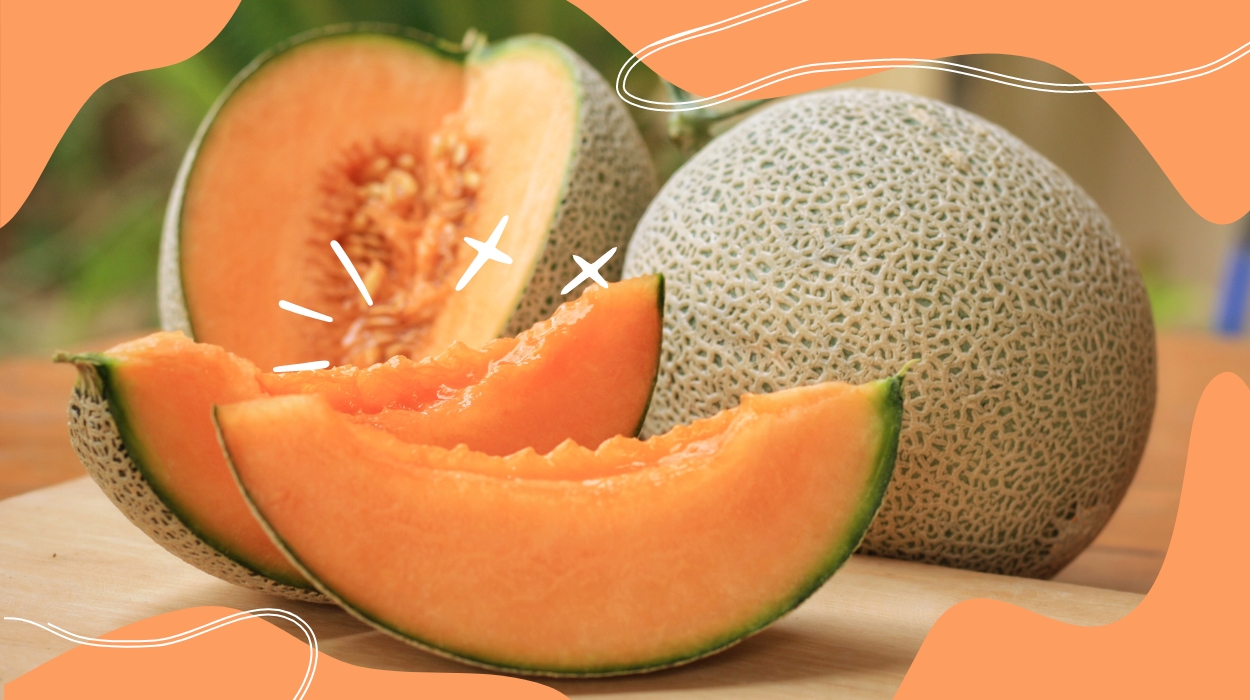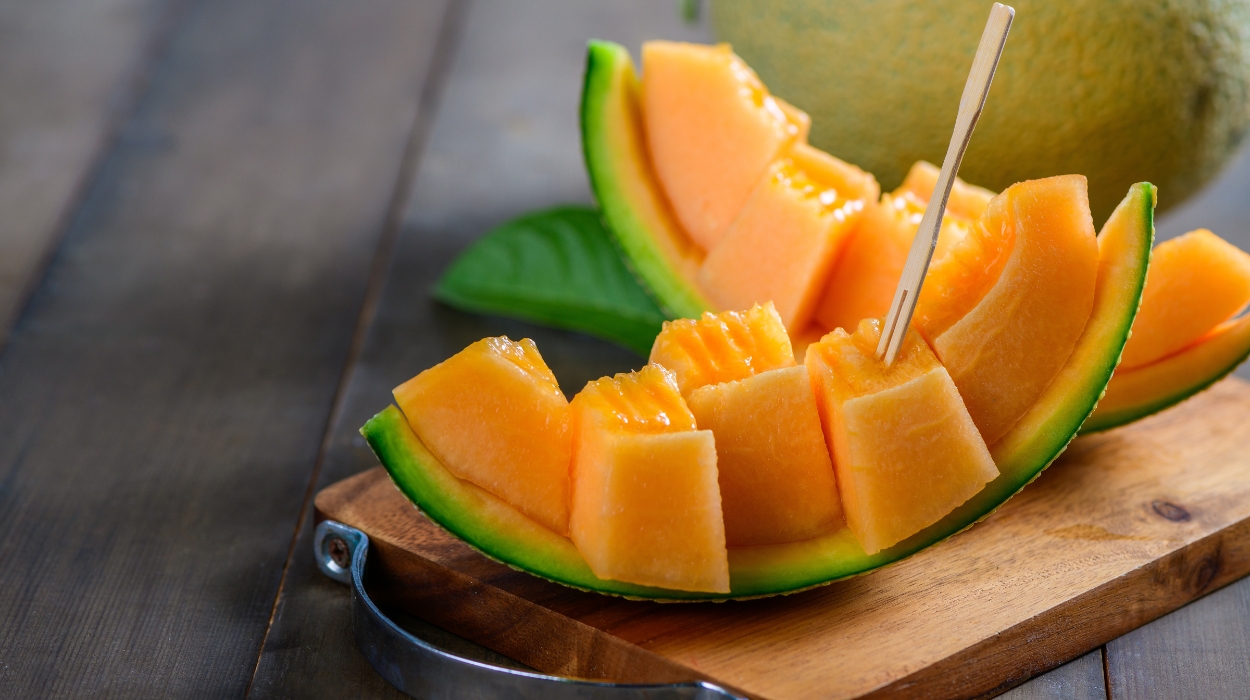 Expert's opinion
Expert's opinion
Expert's opinion
The article is a subjective view on this topic written by writers specializing in medical writing.
It may reflect on a personal journey surrounding struggles with an illness or medical condition, involve product comparisons, diet considerations, or other health-related opinions.
Although the view is entirely that of the writer, it is based on academic experiences and scientific research they have conducted; it is fact-checked by a team of degreed medical experts, and validated by sources attached to the article.
The numbers in parenthesis (1,2,3) will take you to clickable links to related scientific papers.
Is Cantaloupe Good For Weight Loss? Benefits & Ways To Use 2024

Fruits and vegetables should be eaten regularly as part of a healthy balanced diet. This is because they are full of vitamins, minerals, and antioxidants that help the body fight off infections and prevent certain diseases from developing as we age.
The phytonutrients in fruits can be taken in supplement form, but the best way of benefitting from them is by eating a wide selection of them. Some fruits have more of these nutrients than others, but some can have a high glycemic index, so people with diabetes must tread carefully when choosing a fruit to eat.
Cantaloupe is one such delicious fruit that is bursting with phytonutrients and has a moderately low glycemic index score because it is mostly water. Too much cantaloupe can raise blood sugar, however, so portion control is important. So, how beneficial is cantaloupe for our health, and can it help support weight loss?
Is Cantaloupe Good For Weight Loss?
When thinking of losing weight, eating cantaloupe is not usually the first food that comes to mind that can help in the weight-loss battle. However, because it is mostly water and contains fiber, it can help keep hunger at bay longer because it makes us feel full. It is also fat-free and relatively low in calories and helps us stay hydrated. Despite this, it can give the body a significant energy boost before and after exercise.
As a convenient snack food, a fruit platter can offer better snack choices than chips, soda, or corn dogs any day. Say goodbye to the high-fat, high-sodium snacks and opt for cantaloupe on your weight loss journey!
Besides being high in dietary fiber to keep you full and satiated, it is a naturally sweet addition to any low-carb diet and can be incorporated into a keto weight loss plan.
Health Benefits Of Cantaloupe
Cantaloupe is mostly water; it is fat and cholesterol-free and great for rehydration in hot weather or after an exercise session. In addition, cantaloupe contains natural fruit sugars despite having a relatively low glycemic load.
It is also rich in vitamin C, which means it supplies the body with antioxidants. Other benefits of eating cantaloupe are that it contains essential nutrients like vitamin A, folic acid, potassium, manganese, selenium, choline, and copper. Because of the nutritional profile of cantaloupe, including it in your diet can help boost your health, lower high blood pressure (i.e. hypertension), and rid yourself[1] of kidney stones.
Lowers Blood Pressure
Like all healthy foods that can be included in a healthy eating plan, cantaloupe has wide-ranging health benefits, and this is all down to its extensive vitamin and mineral profile.
Cantaloupe is a rich source of potassium, which is vital to the human body because it regulates the heartbeat.[2] It also plays an essential role in nerve and muscle function.
Potassium is involved in synthesizing protein and metabolizing carbohydrates, and this can help increase muscle mass and boost the body’s energy supplies.
Potassium is also a tool for keeping hypertension at bay. A daily supply of this nutrient can help lower high blood pressure. However, for this to be effective, the amount of sodium in our diets needs to be lower than potassium intake.
The average American diet contains more sodium than potassium mostly because consumers are unaware of the amount of hidden sodium in processed foods. So the key to controlling hypertension is consuming more potassium and cutting down on the sodium in our foods. The easiest way to do this is to cut down on junk food and processed meats.
However, having very high potassium levels in the blood can be dangerous, so if you get an adequate supply from your diet by eating cantaloupe and other foods high in potassium daily, then there is no need for supplementation.
Prevents Age-Related Macular Degeneration

Brightly colored fruits and vegetables contain certain antioxidants that give them their distinctive color ranges. Cantaloupe contains lutein[3] and zeaxanthin[4]; the combination of these two antioxidants has been linked to good eye health.
Similar to how antioxidants protect our bodies from free radicals, the presence of lutein and zeaxanthin can also protect the eyes and prevent diseases such as age-related macular degeneration from developing.
These two antioxidants help calm inflammation, fight the effects of oxidative stress, and protect the eyes from sunlight. Both of these potent nutrients have also been linked to lower incidences of cataracts when there is a regular supply in the diet.
Promotes Hydration
If you are on a low-carbohydrate (carb) diet because of weight gain, then the chances are that you will also be partaking in some form of regular exercise to help you shed weight more efficiently.
Working up a sweat and getting the heart pumping are important factors in calorie burning. What is also vital to well-being is that individuals avoid getting dehydrated during and after workouts. Most people would reach for the water bottle, but eating fruits such as cantaloupe can be helpful as well.
This is because cantaloupe is one such fruit full of water and natural fruit sugar. It also contains several electrolytes that are vital for hydration and regulating body pH levels.
Lowers Cholesterol
High cholesterol[5] is a health issue for millions of Americans, and if left unchecked, it can cause heart problems and block arteries. Plant sterols have been scientifically proven to help remove excess cholesterol from the blood. In addition, the fiber in cantaloupe is especially beneficial for lowering bad cholesterol and promoting good cholesterol levels in the body. This is one reason why including whole fruits in the diet is highly recommended.
Lowers The Risk For Metabolic Syndrome
Metabolic syndrome is a disorder in how the body processes nutrients and affects millions worldwide. Consumption of cantaloupe has been found to reduce the risk[6] of developing this syndrome.
Ways To Use Cantaloupe To Lose Weight

If you can gain weight easily, you should include cantaloupe in your healthy diet arsenal. It can be eaten alone or made into a smoothie by mixing it with other fruits and berries and some Greek yogurt with maybe a little almond milk, and you can enjoy a well-rounded snack high in vitamin C and other nutrients. In addition, ingredients that boost metabolism, such as cayenne pepper extract, can also be added to a cantaloupe smoothie.
Fresh cantaloupe can even be used to sweeten vegetable smoothies, and some pumpkin seeds can be thrown in to add some essential fatty acids to the drink. Of course, cantaloupe can also be eaten in fruit and berry salads as well. While it may not contribute much to a high-fiber diet, it remains a low-calorie fresh fruit that can protect you against heart disease.
The Bottom Line
Is cantaloupe good for weight loss? Is melon good for weight management in general? Cantaloupe can help the number on the scale drop because of its high fiber and water content, making you feel fuller for longer.
It is also fat-free and packed full of vitamins and minerals, including vitamin C. So is adding cantaloupe to a diet good? Because of all of the above and the fact that it is bursting full of vitamins, minerals, and phytonutrients, cantaloupe is a worthy inclusion in anyone’s low-calorie diet, whether they are working on weight control or just wanting to eat more healthily. It can also help prevent certain health conditions, so it comes highly recommended!
+ 6 sources
Health Canal avoids using tertiary references. We have strict sourcing guidelines and rely on peer-reviewed studies, academic researches from medical associations and institutions. To ensure the accuracy of articles in Health Canal, you can read more about the editorial process here
- Nih.gov. (2019). Office of Dietary Supplements – Potassium. [online] Available at: https://ods.od.nih.gov/factsheets/Potassium-HealthProfessional/.
- Medlineplus.gov. (2017). Potassium. [online] Available at: https://medlineplus.gov/potassium.html.
- Buscemi, S., Davide Corleo, Pace, F., Maria Letizia Petroni, Satriano, A. and Marchesini, G. (2018). The Effect of Lutein on Eye and Extra-Eye Health. [online] 10(9), pp.1321–1321. doi:https://doi.org/10.3390/nu10091321.
- Abdel-Aal, E.-S.M., Akhtar, H., Zaheer, K. and Ali, R. (2013). Dietary Sources of Lutein and Zeaxanthin Carotenoids and Their Role in Eye Health. [online] 5(4), pp.1169–1185. doi:https://doi.org/10.3390/nu5041169.
- CDC (2023). About Cholesterol. [online] Centers for Disease Control and Prevention. Available at: https://www.cdc.gov/cholesterol/about.htm.
- Do Hyun Park (2021). Fruit Intake to Prevent and Control Hypertension and Diabetes. [online] 42(1), pp.9–16. doi:https://doi.org/10.4082/kjfm.20.0225.



